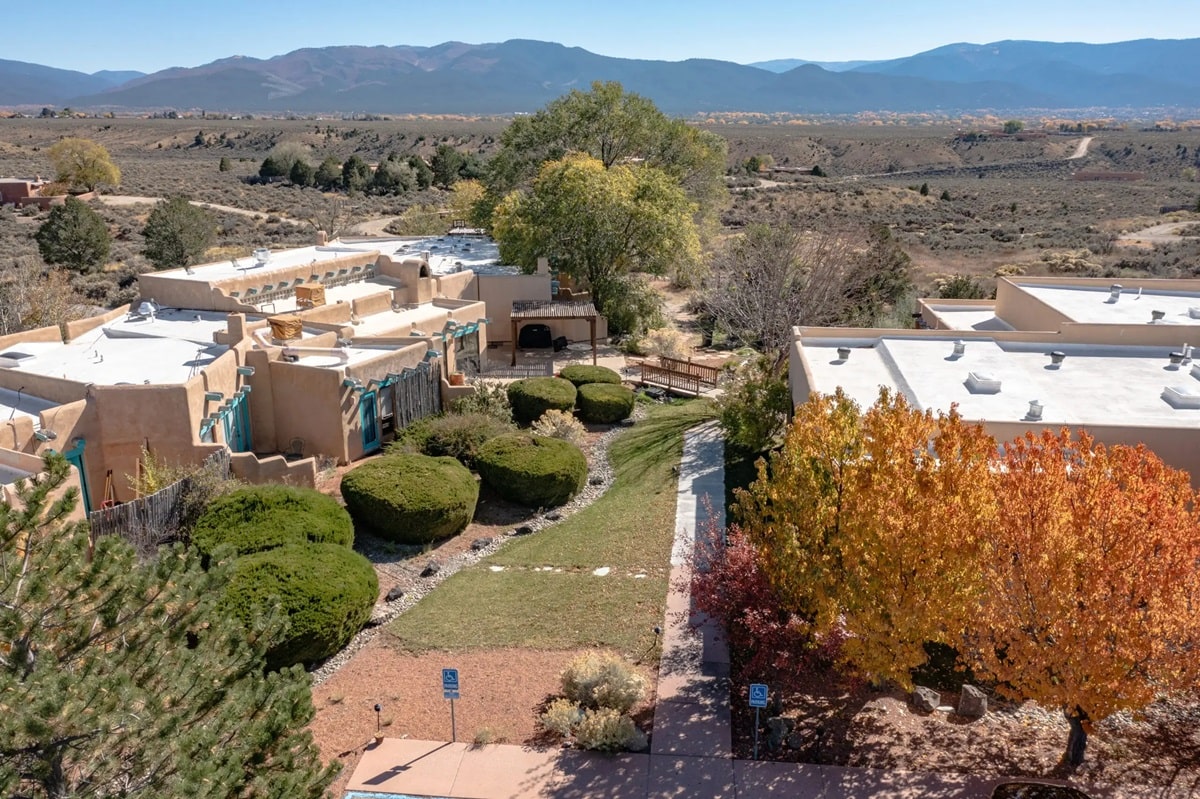The Role of Residential Treatment Programs in Addiction Recovery
Learn more about the benefits of residential treatment programs at Vista Taos Renewal Center.
Our Commitment to Our Residential Treatments
At Vista Taos Renewal Center, our approach to recovery transcends traditional methods by emphasizing holistic healing.
We believe in treating not just the symptoms but the whole person. This means addressing the physical, emotional, spiritual, and social aspects of addiction and mental health disorders.
Our comprehensive care strategy ensures every person receives a tailored experience that fosters true healing and lasting change.

The Role of Residential Treatment Programs in Recovery
Residential treatment programs offer a structured environment where people can focus entirely on their recovery without the distractions or triggers of their daily lives.
These programs are especially helpful for those who need a more intensive level of care to overcome their challenges with addiction or mental health.
At Vista Taos Renewal Center, you will find a supportive community that understands your recovery journey. Here, you’ll get the support you need to achieve lasting wellness.
Understanding Residential Treatment Programs
Residential treatment programs provide intensive, around-the-clock care in a fully supportive environment. They are designed for people who need more structured and comprehensive treatment than what is offered through outpatient services.
These programs involve living on-site at a facility for a set period of time, often ranging from weeks to months.
Who Benefits from Residential Treatment Programs?
Residential treatment programs are particularly beneficial for those who struggle with:
Severe Addiction
If a person’s addiction significantly disrupts their daily functioning or if previous treatment attempts have been unsuccessful, the immersive nature of residential treatment programs can provide the concentrated focus they need.
The structured schedule minimizes distractions and temptations that can lead to relapse, making it easier to focus on developing healthier habits and coping strategies.
Co-Occurring Disorders
Managing a mental health disorder along with addiction can complicate recovery.
Residential treatment programs at Vista Taos are equipped to handle such complexities by providing integrated treatment that addresses both conditions at the same time.1
This approach ensures that the underlying mental health issues are treated alongside the addiction.
Lack of Support at Home
For some people, home may not be a safe or supportive environment for recovery. This could be due to factors like living with family members who also struggle with addiction or being in an unhealthy living situation.
In such cases, residential treatment programs offer a temporary escape from these stressors and the opportunity to focus solely on recovery without external distractions.
Detox or Withdrawal Symptoms
Withdrawal from certain substances can be dangerous and even life-threatening. In residential treatment programs, medical professionals are available 24/7 to monitor physical health and provide necessary medical interventions if needed.
Comprehensive Structure of Residential Treatment Programs
The framework of residential treatment programs is designed to address the various needs and challenges of people in recovery.
The typical program includes:
Therapeutic Sessions
From individual therapy to group sessions, residential treatment programs offer a range of therapeutic approaches to address underlying issues and develop healthier coping mechanisms.
Structured Daily Routine
A structured schedule helps people build healthy habits and routines. This includes:
- Regular mealtimes
- Physical fitness activities
- Daily therapy sessions
Educational Workshops
These workshops provide people with valuable information and skills to support before and after treatment.
Topics may include:
- Relapse prevention
- Stress management
- Communication skills
Supportive Community
Being surrounded by others who understand and are going through a similar journey can provide a sense of belonging and support. This community aspect is often an essential element in the recovery process.
Aftercare Planning
Residential treatment programs also offer support and guidance as people transition back into their daily lives.
This may include:
- Creating a relapse prevention plan
- Connecting with local support groups
- Developing a long-term treatment plan
The Vista Taos Renewal Center Approach to Residential Treatment
We believe that effective treatment extends beyond addressing the symptoms of addiction and mental health disorders; it must also foster:
- Personal growth
- Healing
- The development of new, healthier ways of living
Our residential treatment programs are designed to provide a comprehensive, multi-disciplinary approach to recovery, integrating various therapeutic modalities to support all aspects of well-being – mind, body, and spirit.
Integrative and Whole-Person Approach
In our residential treatment programs, we adopt an integrative and whole-person approach to care. This means that we consider every aspect of a person’s health and well-being in the treatment plan.
Our programs combine traditional methods like psychotherapy and medical management with holistic practices. This integrated approach ensures that all dimensions of health are addressed, helping people recover fully and effectively.
Therapeutic Environment
The environment in which treatment takes place is just as important as the treatment itself.
At Vista Taos Renewal Center, we prioritize creating a safe, nurturing, and therapeutic environment that supports the recovery journey. Our residential facilities are designed to provide a calm and comfortable setting where clients can focus on healing without the stressors of everyday life.
Providing a Safe and Nurturing Treatment Environment
Safety is paramount in our residential treatment programs. We ensure that our facilities are secure and that our staff are always available to provide support.
Nurturing comes from both the physical comfort of our facilities and the warmth and understanding of our staff who are dedicated to each person’s well-being.
Components and Services of Our Residential Treatment Programs
From the moment clients join our program, they receive access to a full spectrum of therapeutic and medical services to promote healing and sustainable recovery.
This includes:
Individual Counseling
This allows for personalized attention and support, enabling people to explore deep personal issues in a private setting. Individual counseling is crucial for addressing the root causes of addiction and for developing personalized coping strategies.
Group Therapy
Group sessions provide a platform for peer support and shared experiences. They are essential for fostering a sense of community and for helping people learn from the experiences of others who are facing similar challenges.
Medication Management
Our medical team can prescribe and monitor medication as needed to manage symptoms related to mental health disorders or addiction.
Holistic Approaches
Our programs also offer a range of holistic therapies such as:
- Yoga
- Meditation
- Mindfulness practices
These can enhance overall well-being and promote relaxation and self-awareness.
Clinical Assessment and Treatment Planning in Our Residential Treatment Programs
Assessment helps us understand each person’s specific needs and the nature of their challenges. The process involves gathering information through:
Psychological Assessment
A psychological profile is created through interviews and standardized tests to identify any mental health conditions and to understand each client’s emotional and cognitive functions.
Medical Evaluation
Our medical team conducts a comprehensive physical exam and collects information about a person’s medical history to evaluate how it may affect their current condition.
Social History
We gather information about each client’s:
- Personal background
- Family dynamics
- Social support system
This helps us understand the factors that may contribute to their current situation.
Substance Use History
Here, we ask questions like:
- How long have you been using substances?
- What type of substances are you using?
- How often do you use them?
We gather this information to better understand a person’s substance use and any potential withdrawal symptoms.
Development of Personalized Treatment Plans
Following the initial assessment, the next step is developing a personalized treatment plan. This plan is crafted based on:
- The comprehensive assessment results
- Individual needs
- Specific treatment goals
The treatment plan outlines the recommended therapies and interventions that will be used to help clients achieve their recovery goals. It also includes a timeline for each stage of treatment, as well as any necessary medications or additional resources.
Collaborative Approach in Treatment Planning
One of the defining features of our residential treatment programs is the collaborative approach we take in treatment planning. Clients are active participants in this process, not just recipients of care. This collaborative planning involves regular discussions between clients and their treatment team.
Clients are encouraged to provide feedback and express concerns or preferences throughout the treatment process. This ensures that the treatment plan is tailored to their specific needs and goals, increasing the chances of successful outcomes.
Ongoing Assessment and Monitoring
The treatment plan is not set in stone. As clients progress through treatment, ongoing assessments are conducted to determine the effectiveness of the interventions and therapies being used.
Responses to treatment will be closely monitored and any necessary modifications will be made to ensure that the treatment plan remains effective. Throughout this process, clients will continue to have a voice in the decision-making and modification of their treatment plan.
Therapeutic Modalities Used in Residential Treatment Programs
Our commitment to providing the most effective treatment involves employing a variety of evidence-based therapies. These therapies have been rigorously tested and proven to be effective through scientific research.
At Vista Taos Renewal Center, we focus on the following key therapies:
Cognitive-Behavioral Therapy (CBT)
Dialectical Behavior Therapy (DBT)
DBT is particularly effective for those who experience intense emotions. It works by teaching skills to help people manage stress, regulate emotions, and improve relationships with others through a focus on:
- Mindfulness
- Distress tolerance
- Emotional regulation
- Interpersonal effectiveness
Motivational Interviewing (MI)
MI is a counseling approach that helps resolve ambivalence about entering treatment and making behavioral changes. It enhances motivation to change by helping people identify their values and the discrepancies between their current behavior and broader life goals.
Integration of Experiential Therapies and Holistic Approaches
In addition to these core therapies, Vista Taos Renewal Center integrates experiential therapies and holistic approaches to provide a comprehensive treatment experience.
Experiential therapies offer creative outlets for expression and emotional exploration. Holistic approaches focus on the mind-body connection and promote overall well-being.
Together, these therapies help individuals:
- Develop self-awareness
- Build coping skills
- Cultivate a healthier lifestyle
Medication Management and Medical Oversight in Residential Treatment
For many, medications are essential for stabilization. They address medical or psychiatric conditions that affect addiction recovery. This includes managing depression, anxiety, or other mental health disorders.
However, medication is just one aspect of the treatment plan and is always used in conjunction with therapy and other forms of support. At Vista Taos Renewal Center, medication management is overseen by our team of healthcare professionals.
Importance of Medication Adherence, Monitoring, and Support
Sticking to the medication plan is often a cornerstone of successful recovery. Our staff provides continuous education and support to help clients understand the role of each medication, how it aids in recovery, and the importance of taking it as prescribed.
We aim to provide reassurance and encouragement to help clients maintain their treatment regimen. Our team is always available to discuss any concerns about medications.
Holistic and Wellness Activities in Residential Treatment Programs
Recognizing that recovery involves the whole person, we recommend integrating these activities into daily routines. This approach helps people develop healthier lifestyle habits and improves both mental and physical health.
Some holistic practices we offer include:
Yoga and Meditation
Yoga offers a way to strengthen the body while calming the mind, providing a physical exercise that is also deeply meditative and restorative.
Meditation sessions focus on mindfulness and stress reduction, teaching people techniques to manage anxiety and promote mental clarity.
Experiential Therapy
This includes art therapy and outdoor experiential therapies. Each of these therapies is designed to help people express themselves creatively and explore new, healthy ways to communicate feelings and experiences.3
Art therapy can be particularly powerful tools for personal reflection and emotional exploration. Outdoor activities, such as guided hikes or gardening, utilize the healing aspects of nature to promote peace and well-being.
Physical Fitness
Regular physical activity is encouraged through our residential treatment programs to help improve not just physical health but also mental and emotional stability.
Our fitness programs are designed to be accessible to people at all levels of fitness and recovery, focusing on building:
- Strength
- Endurance
- Flexibility
Supporting Physical, Emotional, and Spiritual Wellness
The holistic and wellness activities in our residential treatment programs are chosen to support physical, emotional, and spiritual wellness. Practices such as art therapy or being present in nature can help people process and express feelings in a safe and therapeutic environment.
Spiritually, these activities encourage connection and reflection, which can lead to a renewed sense of purpose and peace. This spiritual aspect of wellness is often pivotal in recovery, as it fosters a deeper understanding of self and a reconnection with one’s values and beliefs.
Physically, activities like yoga, hiking, and sports can improve physical health and release endorphins that boost mood.
Family Involvement and Support in Residential Treatment Programs
A well-informed and supportive family is often an essential part of the recovery process. Our residential treatment programs offer family therapy and support groups to help families better understand addiction and provide them with tools to support their loved one in recovery.4
Involving the family can also help identify any potential underlying issues within the family dynamic that may have contributed to addiction. By addressing these issues, we can promote healing and strengthen relationships.
Here’s how we support families:
Family Therapy Sessions
Our therapists work with the whole family to address any issues that may have arisen due to addiction. These sessions also help families develop healthy communication and boundaries.
Educational Resources
We offer educational resources for families to better understand addiction, including workshops and educational materials. These resources can provide families with a deeper understanding of addiction and how they can best support their loved one’s recovery journey.
Importance of Family Involvement in the Treatment Process
When families are actively involved in the treatment process, they become instrumental in creating a supportive environment that can significantly enhance your chances of successful recovery.
Having loved ones involved in treatment can also help people feel more supported and motivated to stick with the program. It can also provide a sense of accountability, as clients have people who care about their well-being holding them accountable for their actions.
Additionally, family involvement can help rebuild trust and repair any damaged relationships that may have occurred as a result of addiction. This can lead to a stronger support system for continued sobriety after completing treatment.
Aftercare Planning and Transitioning Out of Residential Treatment Programs
Effective aftercare planning ensures clients have the tools and strategies needed to maintain the progress made during treatment and to manage the challenges of everyday life without relapse.
The planning process begins well before discharge, involving:
- An evaluation of a client’s progress and areas of improvement during treatment
- Identifying potential triggers and developing coping strategies
- Establishing a support system, including family involvement and connecting with community resources
- Creating a relapse prevention plan
This plan outlines the steps clients will follow after leaving the residential program, aiming to reinforce recovery and prevent potential setbacks.
Our Aftercare Resources
At Vista Taos Renewal Center, we make the transition into aftercare as seamless as possible by providing clients with various resources, including:
Alumni Programs
Our alumni program allows clients to connect with other people who have completed our residential treatment programs.
This support network allows people to:
- Share experiences and insights
- Gain encouragement
- Maintain connections with people who understand the journey of recovery
Relapse Prevention Planning
We provide detailed relapse prevention plans tailored to address each person’s specific challenges and triggers.
These plans include strategies for:
- Coping with stress
- Avoiding high-risk situations
- Recognizing early signs of potential relapse
Referrals to Community Resources
We connect clients with various community resources such as therapy groups, counseling services, and support groups. These referrals are chosen based on each person’s specific needs and geographical location to ensure they have access to continued support.
Ongoing Support
The support from Vista Taos Renewal Center does not end upon graduating from our residential treatment programs.
We are committed to each client’s long-term success and provide ongoing resources to help with their transition.
Our aftercare support includes regular follow-up meetings, check-in calls, and access to counseling services to ensure they are adapting well to their new routine and maintaining sobriety.

Begin Your Journey to Wellness with Vista Taos Renewal Center
At Vista Taos Renewal Center, our commitment to providing compassionate, individualized, and effective treatment within our residential treatment programs is unwavering.
We understand that each journey to recovery is unique, and our approach is designed to address the specific needs of each person. Our residential treatment programs offer a comprehensive blend of traditional and holistic therapies for a well-rounded approach to healing.
We pride ourselves on creating an environment where you can feel safe to explore the challenges of recovery while being supported every step of the way.
Seek Help and Support
If you are struggling with addiction or mental health issues, we encourage you to reach out for help. Admitting that you need support is a brave first step toward recovery.
At Vista Taos Recovery Center, you will find a team of dedicated professionals who are committed to helping you overcome your challenges and achieve long-term wellness. Remember, seeking help is a sign of strength, and taking that step is crucial for beginning your path to recovery.
Embark on a Path to Transformation
We invite you to embark on your journey to transformation and thriving with the Vista Taos Renewal Center. Join us and tap into a supportive network that values your well-being and champions your recovery.
Table of Contents
Ready to Renew Your Life and Well-Being?
Reach out to Vista Taos Renewal Center today and let us guide you toward sustainable recovery. We will help you heal from the addictions and substance use challenges that hinder you from leading your most fulfilled life through personalized, whole-person treatment.




